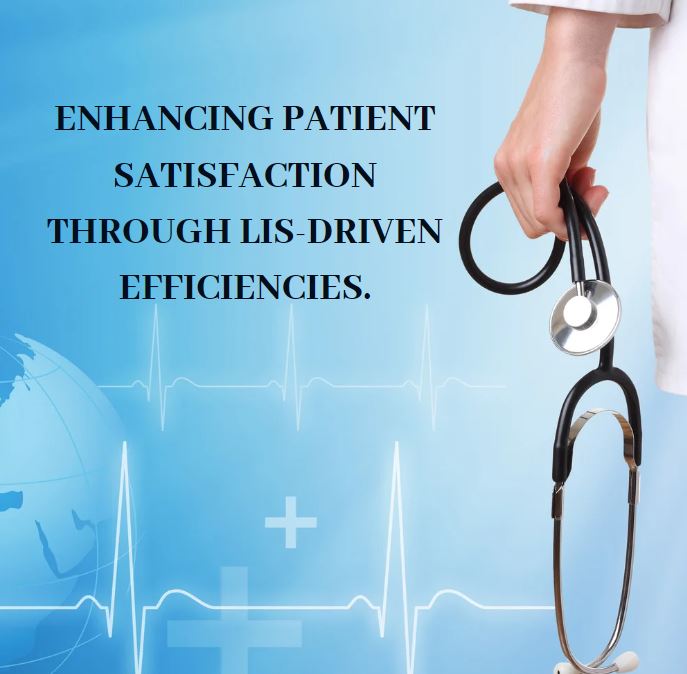In today's rapidly evolving healthcare landscape, patient satisfaction has become a key metric for measuring the success of healthcare providers. From the moment a patient enters a healthcare facility to the point of discharge, every aspect of their experience plays a vital role in determining their overall satisfaction. One significant factor influencing patient satisfaction is the efficiency and effectiveness of Laboratory Information System (LIS) software.
LIS software serves as the backbone of laboratory operations, facilitating the management of patient samples, test results, and other critical data. However, its impact extends far beyond the laboratory walls, significantly influencing the overall quality of patient care. In this article, we'll explore how LIS-driven efficiencies contribute to enhancing patient satisfaction across various aspects of healthcare delivery.
Streamlined Workflows and Reduced Wait Times
One of the primary ways LIS software enhances patient satisfaction is by streamlining laboratory workflows and reducing wait times for test results. By automating processes such as sample tracking, result analysis, and report generation, LIS software minimizes delays in the diagnostic process, allowing healthcare providers to deliver timely and accurate care to patients.
Imagine a scenario where a patient visits their healthcare provider for a routine check-up and requires blood tests. In a healthcare facility equipped with efficient LIS software, the phlebotomist can quickly collect the necessary samples and input relevant patient information into the system. The samples are then seamlessly routed to the laboratory, where automated processes prioritize and perform the required tests.
As a result, the patient experiences minimal wait times, receiving their test results promptly. This not only reduces anxiety and uncertainty for the patient but also enables healthcare providers to make informed decisions regarding diagnosis and treatment in a timely manner.
Improved Communication and Coordination
Effective communication and coordination among healthcare professionals are essential for delivering high-quality care and ensuring a positive patient experience. LIS software plays a crucial role in facilitating communication by providing a centralized platform for accessing and sharing patient data and test results in real-time.
For example, when a laboratory technician completes the analysis of a patient's blood sample, the results are automatically updated in the LIS software. This information is then accessible to the attending physician, who can review the results, make clinical decisions, and communicate with the patient about their diagnosis and treatment plan without delay.
Furthermore, LIS software enables seamless collaboration among multidisciplinary healthcare teams, allowing specialists from different departments to share insights and coordinate care effectively. This interdisciplinary approach not only enhances the quality of care but also fosters trust and confidence in patients, knowing that their healthcare providers are working together to address their needs.
Personalized Patient Engagement
In addition to streamlining workflows and improving communication, LIS software empowers healthcare providers to deliver personalized patient engagement, thereby enhancing the overall patient experience. Through patient portals and interactive dashboards integrated with LIS software, patients can access their medical records, test results, and educational resources conveniently from their own devices.
For instance, a patient undergoing treatment for a chronic condition can use the patient portal to monitor their laboratory test results, track their progress over time, and receive personalized recommendations for managing their health. This level of engagement not only empowers patients to take an active role in their healthcare journey but also strengthens the bond between patients and healthcare providers.
Moreover, LIS software can facilitate proactive outreach and follow-up care, such as automated reminders for preventive screenings or medication adherence. By leveraging data analytics and decision support tools within the LIS software, healthcare providers can identify patients at risk of adverse health outcomes and intervene early to prevent complications, ultimately improving patient outcomes and satisfaction.
Conclusion
In conclusion, LIS software plays a pivotal role in enhancing patient satisfaction by driving efficiencies throughout the healthcare delivery process. From streamlining laboratory workflows and reducing wait times to improving communication and coordination among healthcare professionals, LIS-driven efficiencies contribute to a positive patient experience and improved clinical outcomes.
As healthcare providers continue to prioritize patient-centered care and strive for excellence in service delivery, investing in advanced LIS software solutions becomes increasingly essential. By harnessing the power of technology to optimize laboratory operations and engage patients in their care, healthcare organizations can achieve greater efficiency, effectiveness, and ultimately, higher levels of patient satisfaction.
In the ever-evolving landscape of healthcare, LIS software stands as a cornerstone of innovation, driving positive change and transforming the way healthcare is delivered and experienced by patients worldwide.
Also, if you are looking for saas development services in USA, then informics Digital is the best one.





Comments